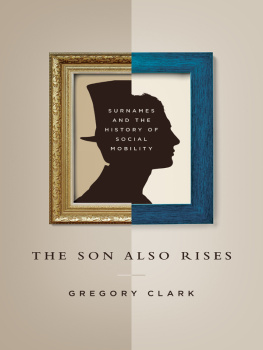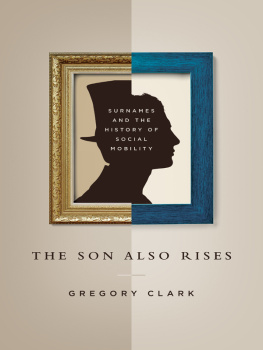
THE SON ALSO RISES
THE PRINCETON ECONOMIC HISTORY OF THE WESTERN WORLD
Joel Mokyr, Series Editor
A list of titles in this series appears at the back of the book.
THE SON ALSO RISES
SURNAMES AND THE HISTORY OF SOCIAL MOBILITY
GREGORY CLARK
with Neil Cummins,
Yu Hao, and
Daniel Diaz Vidal
and Tatsuya Ishii,
Zach Landes,
Daniel Marcin,
Firas Abu-Sneneh,
Wilfred Chow,
Kuk Mo Jung,
Ariel M. Marek, and
Kevin M. Williams
PRINCETON UNIVERSITY PRESS
Princeton and Oxford
Copyright 2014 by Princeton University Press
Published by Princeton University Press, 41 William Street, Princeton, New Jersey 08540
In the United Kingdom: Princeton University Press, 6 Oxford Street, Woodstock, Oxfordshire OX20 1TW
press.princeton.edu
Jacket design by Faceout Studio.
All Rights Reserved
Library of Congress Cataloging-in-Publication Data
Clark, Gregory, 1957
The son also rises : surnames and the history of social mobility / Gregory Clark.
pages cm.(The Princeton economic history of the Western world)
Includes bibliographical references and index.
ISBN 978-0-691-16254-6 (hardcover : alk. paper)
1. Social mobilityHistory. I. Title.
HT612.C53 2014
British Library Cataloging-in-Publication Data is available
This book has been composed in Minion Pro with Maestrale display
by Princeton Editorial Associates, Inc., Scottsdale, Arizona.
Printed on acid-free paper.
Printed in the United States of America
10 9 8 7 6 5 4 3 2 1
To Mary
CONTENTS
PREFACE
T HIS BOOK WILL BE CONTROVERSIAL. So the first task of this preface is to establish that while those listed on the title page collaborated on estimates of social mobility rates in various societies, the text itself was written by me. The interpretation of the evidence from these studies, and the proposed theory of mobility presented in the book, all represent my opinion alone. Also, none of the people I thank below should be taken as endorsing the conclusions of the book.
My second task is to note that the spirit and style of this book follow those of my earlier book, A Farewell to Alms: A Brief Economic History of the World. It tries to show that extraordinarily simple models of social mobility can successfully predict outcomes across a whole range of societies and institutions. This is a claim based on incomplete evidence. It may be wrong. But even if it is wrong in aspects, I hope it will point the way to a better and more complete theory of the mechanisms of social mobility. Even in an area as freighted with aspirations and disappointments as social mobility, there should still be room for exploration and conjecture.
The work discussed in this volume was undertaken with several collaborators. The most extensive collaboration was with Neil Cummins, who is jointly responsible for most of the material in Japan is based on an exploration Tatsuya Ishii did for his senior thesis at UC Davis. Zack Landes assisted in getting the estimates for Bengal, including figuring out how to download the 2.2 million names of people in the Kolkata electoral register, the task itself being performed admirably by Lincoln Atkinson. Daniel Marcin of the University of Michigan alerted me to the existence of the tax lists for the United States published in newspapers in 1824 and 1825 and was able to supply us with several such lists. Firas Abu-Sneneh, Wilfred Chow, Kuk Mo Jung, Ariel Marek, and Kevin Williams, students in my graduate history class, worked on the social mobility of Ivy League students from 1850 and earlier as a class project. To all these collaborators I owe a debt of gratitude. This book would not have been possible without their contributions.
This has not been an easy book to complete. A major obstacle was the limited abilities of the principal author. Patterns that seem blindingly obvious in retrospect were initially missed or dismissed. The original intent of the project was just to extend conventional mobility estimates from the modern world into the distant past in countries like England and India. Thus, in the early stages of the research, I gave sunnily optimistic talks about the speed and completeness of social mobility. Only when confronted with evidence of the persistence of status over five hundred years that was too glaring to ignore was I forced to abandon my cheery assurance that one of the joys of the capitalist economy was its pervasive and rapid social mobility. Having for years poured scorn on my colleagues in sociology for their obsessions with such illusory categories as class, I now had evidence that individuals life chances were predictable not just from the status of their parents but from that of their great-great-great grandparents. Indeed there seems to be an inescapable inherited substrate, looking suspiciously like social class, that underlies the outcomes for all individuals. This book is the product not of acute intelligence but of muddling through to a conclusion that should have been obvious to anyone who looked.
A second obstacle was the extent of the data collection needed to expand the scope of the original study to a wider range of countries and time periods. I am grateful for the grant I received from the NSF (SES-0962351), which was crucial to financing this effort. I am grateful also to the various research assistants who were employed with these funds: Douglas Campbell, Yu Hao, Xi He, Natalie Ho, Tatsuya Ishii, Max McComb, Claire Phan, Richard Scriven, Stephen Sun, and Daniel Diaz Vidal at UC Davis, and Joseph Patrick Burke and Raphaelle Schwarzberg in London. Grants from the All-UC Group in Economic History to Yu Hao and Daniel Diaz Vidal to aid their dissertation research, and a fellowship from the Economic History Association to Yu Hao, were also enormously helpful. John Daniels and Jean Stratford of the Social Science Data Service at Davis were generous with their help on many issues of organizing data collection. Ancestry.com was generous in allowing Neil Cummins and me special access to its wonderful online data sources for the purposes of research.
This whole project was actually sparked by a suggestion of Nicholas Wade, a science writer for the New York Times, that surnames could be used to test a hypothesis from the earlier book, of higher reproductive success among upper social classes in preindustrial England. I am happy to report that they confirm that hypothesis. But in exploring surnames, I came to realize that they say a lot more about the nature of the social world.
As before, I owe a huge debt to Princeton University Press. Joel Mokyr, the series editor, and two reviewers of the manuscript, Joe Ferrie and Cormac Grda, were extraordinarily generous with their time and expertise. Peter Dougherty managed to take time from his more-than-full-time job directing the press to cajole the manuscript to completion, including spending a whole day with me in Los Angeles trying to wrestle an early, inchoate draft into a functioning shape.
Peter Strupp and his team at Princeton Editorial Associates did a stellar job in designing the book and marching it, and its author, through a tightly compressed production schedule.
As always, I owe a great debt to my colleagues in the economics department at UC Davis, first for providing a congenial and intellectually stimulating environment and next for listening over lunch to endless accounts of the arcana of surname practices and to a variety of half-baked theories of the nature of the social world we inhabit. Colin Cameron contributed the insight that led to the simple model that underlies the book. Pontus Rendahl, my former colleague, was pressed into service for his knowledge of Swedish institutions.
Next page












